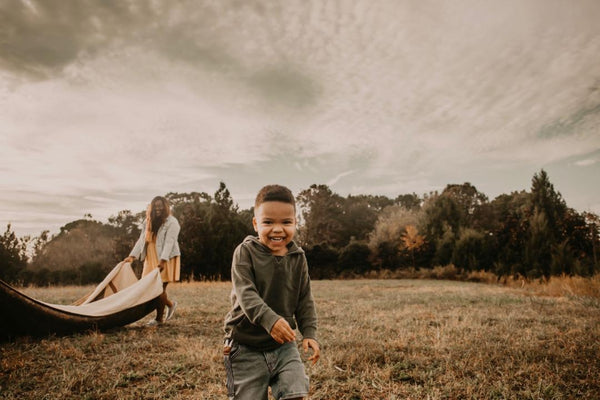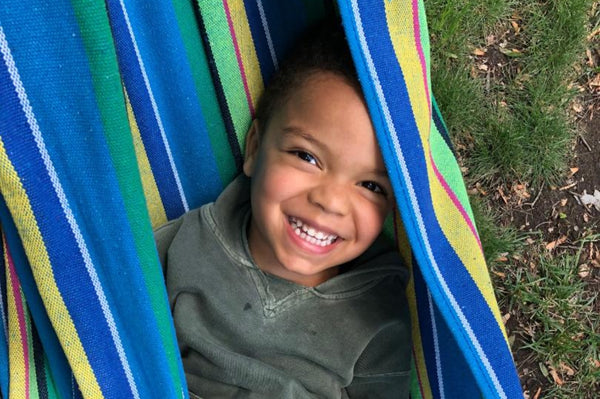
Why This Four-Year-Old's Video On Skin Color Needs To Go Viral

You walk into a store and you can feel the stares on your back. You look down at your child and you know they are looking at him. Their eyes are asking questions that their mouths are too shy to speak.
And then they do …“Is he your son?” …
Ebony Mudd has been in that store and felt those eyes and answered those questions.
As an African-American woman married to a white man, Ebony and her husband Michael have made it their mission to teach their four-year-old son, Max, about emotions and inclusion. “Having a biracial son puts me in a tricky spot,” says Ebony. “Some people in the world will see my son as black and make negative assumptions about him. Some people in the world will see my son as having it easy because he’s light-skinned. And others know the truth, he will have to balance on this weird line of trying to fit into both worlds as he grows up.”
Max shares his views on skin color below:
“Diversity is beautiful and inclusion starts with our family,” shares Ebony. “We knew one day our son would encounter the question, ‘So, your mom is black and your dad is white?’ and we wanted him to be prepared. I want him to be proud to have a black mom and a white dad. I want him to have no questions about why he was made this way. And most importantly, I want him to have the language, tools and the heart to stand up for diversity and inclusion when he faces it in the world.”
For Ebony, those tools start with teaching about emotions. “It’s my job as a parent to make all emotions safe, even the hard ones ... especially the hard ones. If you’re scared to feel mad, you will suppress it, and suppressing emotion can lead to hate, not only towards yourself but towards others who are different from you.”
Ebony shares that teaching children about emotions lays a foundation for building skills of social justice. “It starts at the youngest of ages, and it begins with teaching our children the power of their emotions, words, and actions. When children learn to speak and feel their emotions confidently, they will be able to do it on behalf of others, too. Giving our kids a voice is what we are doing when we allow them to feel, and when we teach them what to do with those feelings.”
When it comes to celebrating differences, Ebony says that her family started at age one. “We started basic,” she explains. “I would say we really started diving in around 2 years old and now, at 4 years old, we have added more challenging topics.”
Ebony shares that she and Michael have goals for Max to see all people, regardless of gender, race, color, religion, ability, and preferences. “One of my biggest hopes for my son is that he will be anti-hate and lead the pack when it comes to inclusion! We have to be intentional if we want our kids to be anti-hate, anti-racist, and to lead with love. I think a lot of people think that if they aren’t teaching their kids to be racist that it automatically will make them anti-racist. But this isn’t necessarily the truth.”
She continues, “I want my son to be an ally for anyone in a marginalized community. To be an ally means to be a helper and, to be a helper, is a skill to learn. But it starts now, while he is young. It has to be taught by us because we can’t count on the world to do that.”

Ebony encourages other families to have these discussions, too. While she admits that many parents may feel unsure of how to approach these topics with their children, Ebony stresses that the importance lies in starting. “Just start wherever you are. Starting small is better than not starting at all. A lot of our life is dictated by saying or doing the right thing. But this conversation can’t afford to wait and as parents we have the skills inside of us not only to teach but learn alongside our children!”
She shares that crafts are a fun way for families to discuss differences with their young children. “This is great if you fear not having the right words. We would get construction paper - tan, brown, dark brown - and start making faces - different skin colors, different hair, different nose sizes, lip sizes, eye shapes, etc. I would say, ‘let’s make mommy, and daddy, and you’ and then we would talk about how we are all beautiful in spite of our differences.” Ebony said that using crafts as a gateway to discuss differences served as a foundation for more serious topics as Max grew older.
Another great tool for parents is simply sharing facts. “I taught my son WHY my skin color was darker and we talked about melanin. He loved learning more. It doesn’t have to be a stuffy conversation and we don’t have to assume they don’t get it. When kids know the why behind something, it helps them understand. And understanding is half of the battle when it comes to why people won’t include a group different than them.”
Becoming intentional with books during storytime also supported Ebony’s family values. “We have books with main characters in wheelchairs, with one leg, with autism ... main characters that don’t speak English, who can’t see, who wear Hijabs, so on and so forth. We also read books to him and listen to music in other languages. The point isn’t to understand the book or song! It’s important that he sees ME and him struggle with another language. If he ever meets a child or adult who struggles with English, he will be understanding because he gets it! He simply says, ‘Some people speak different languages and that’s ok!’”
Children’s books that Ebony suggests include:
“Because of the diverse books we read, it opens up the conversations I can have with him about how he can engage with kids different from him. We’ve talked about how he can play with a kid who can’t hear. We’ve taught him how to say things like, ‘will you play with me?’ in sign language. Our hope is that anyone he encounters will feel included.”
Ebony proposes to parents, “If you are really stuck, reach out to a person of color for guidance. You may feel weird, but they will feel loved and seen and so happy that you want to learn more! Our kids can be the generation to change the hate in this world, and it starts with us educating them.”

Becoming mindful and intentional in our own homes is where it starts. Realizing that although the news stories seem out there, away from us, they are really much closer to our homes and hearts. “These aren’t just news stories. These are people’s lives. My children.Your children.”
Ebony shares, “Hearing news such as Ahmaud Arbery's shooting makes me realize that it’s no longer good enough to be NOT racist. We need more people stepping up and being ANTI-RACIST. That means looking into how we can do more, learn more, and teach more. Being sad when tragedies happen isn’t enough anymore, we need people who are boldly speaking out against it, voting for people with a plan to stop it, calling police departments to demand change (like the use of body cams) … things like that.”
More than anything, these times show Ebony the importance of the work she is doing within her home. “It shows me that I need to continue the work I’m doing with my son to make sure he is taught to stand up and speak up. It shows me that I need to educate my white friends about how they can help me and people of color feel safe in this country. Maybe they can’t change the world? But they can start with their kids. And our kids WILL change the world.”
_____________
*** Ebony shares that she is in the process of writing her own children’s book that highlights diversity. She also holds virtual story readings every Saturday at 10 am EST where she shares a book and a live kid-friendly awareness talk with her co-host Max.
Generation Mindful creates educational tools, toys, and programs that nurture emotional intelligence through play and positive discipline. Join us and receive joy in your inbox each week.
Share





